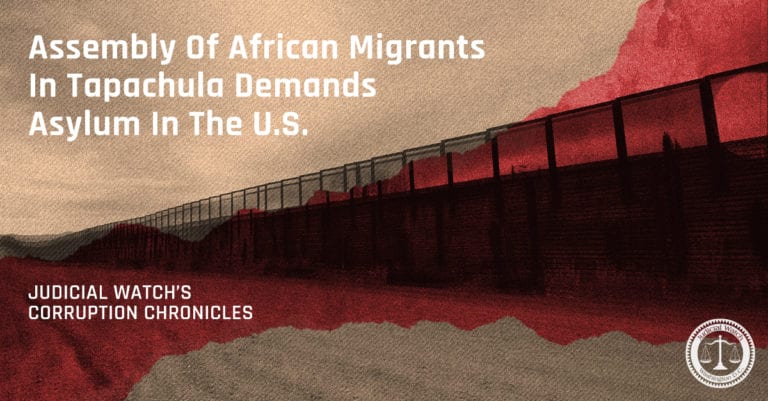

Assembly of African Migrants in Tapachula Demands Asylum in U.S.


Among the multitude of migrants waiting in Mexico to get asylum in the United States are thousands of Africans boldly demanding passage into the country. They are far more coordinated than their Central American caravan counterparts and have formed an official organization to spread their message and advocate on their behalf. The group accuses Mexican authorities of discrimination and racism and is ordering Mexico to grant visas that allow them to continue their trek north to seek “protection” in America.
For about three months the Africans have been holed up in Tapachula, in the southeast Mexican state of Chiapas bordering Guatemala. They traveled for two months and crossed eight countries to reach Mexico, they assert in a mission statement that outlines their suffering as well as their demands. “We have climbed mountains and valleys,” the document reads. “We have crossed rivers with strong current. We have slept in the middle of the mud. We have gone hungry and drank rainwater to survive. We have seen bodies of migrant brothers on the road, dead of exhaustion, or drowned in the rivers. The jungle is populated by wild animals, snakes and poisonous insects. In that territory there are also criminals who assault people, who rape girls and women, killing those who try to resist. Many of us have lost all our belongings, including our official documents. We have gone through extremely dangerous cities and towns. We had to hide. We have suffered extortion and threats by authorities in Panama, Nicaragua, Honduras, Guatemala and Mexico.”
They describe themselves as the Assembly of African Migrants in Tapachula, a group of 3,000 men, women (many pregnant), boys and girls from various African nations, including Angola, Burkina Faso, Cameroon, Eritrea, Ethiopia, Ghana, Guinea Conakry, Liberia, Mali, Mauritania, Congo, Senegal, Sierra Leone and Togo. They claim they left Africa because they suffered “political persecution” due to their religious beliefs and “sociocultural identities.” They also write in the statement that their homeland is “impoverished and subdued from the Western powers” though they aspire to obtain asylum in a nation considered to be a Western power. “Since we left our countries, for us life has been a permanent escape,” according to the mission statement. “We feel despair, hopelessness, fear, demoralization, loneliness and abandonment.” The Africans say Mexico is violating their human rights and that they are “suffering constant acts of racism and hostility by the immigration authorities.”
The African migrants want the Mexican government to process them collectively, rather than individually, and demand better living accommodations as well as the freedom to leave Tapachula where they feel “blocked and desperate.” They insist it is their right to travel north “in search of protection in the United States or Canada” and that Mexico has an obligation to grant them visas without delay so they can move from Tapachula. While they’re in the host country, they “require urgent humanitarian assistance in matters of food, housing, health and hygiene, to prevent the deterioration of our physical and mental health, and the loss of lives.” One more demand, the Africans want assurances from Mexican law enforcement that there will be no “reprisals” when they conduct violent protests, including blocking access to the local federal immigration headquarters so that employees could not get to work. During one of the uprisings Mexican police officers suffered lesions, bites and other injuries from rocks hurled at them by the Africans. A Mexican news outlet features a video of the revolt. A few days ago, hundreds from the Assembly of African Migrants marched through neighborhood streets demanding “free transit” through Mexico, according to another local news report. The Africans do not want to stay in Mexico, they assure.
A record number of Africans have entered Mexico this year with the intention of reaching the U.S., according to data provided by Mexico’s interior ministry. The figures were published earlier this year in an international newswire story that states the number of Africans registered by Mexican authorities tripled in the first four months of 2019 compared to 2018. Their goal is to come to the United States.















